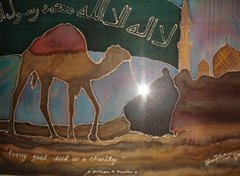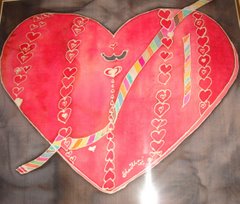
Maria-01/01
Maria Al-Qibtiyya (ra)
The Prophet (saw) said: “Allah (swt) has commanded me to marry with the women of Paradise only”.
Maria (ra), Al-Qibtiyyah was born in upper Egypt of a Coptic father and Greek mother.
After the consolidation of power by the first Muslims over Mecca and Medina, The Prophet (saw), dispatched emissaries bearing the glad tidings of the revealed Word to the great kings of the Middle East.Hateb bin Balta’a was sent to one of the greatest king, Al Muqawqas of Egypt, who was a Coptic Christian.Hateb approached the king, and announced to him the message of the truth.
Al-Muqawqas showers gifts upon the Prophet (saw)
Al Muqawqas finally concluded the discussion respectfully by saying
I have found that this Muhammad has the quality of being a genuine Prophet, which will allow him to produce the hidden and to proclaim in confidence.
Al Muqawqas told Hateb (ra), to return to his land and he granted many gifts to convey his respect to Muhammad (saw).
The Prophet (saw) said: “Allah (swt) has commanded me to marry with the women of Paradise only”.
Maria (ra), Al-Qibtiyyah was born in upper Egypt of a Coptic father and Greek mother.
After the consolidation of power by the first Muslims over Mecca and Medina, The Prophet (saw), dispatched emissaries bearing the glad tidings of the revealed Word to the great kings of the Middle East.Hateb bin Balta’a was sent to one of the greatest king, Al Muqawqas of Egypt, who was a Coptic Christian.Hateb approached the king, and announced to him the message of the truth.
Al-Muqawqas showers gifts upon the Prophet (saw)
Al Muqawqas finally concluded the discussion respectfully by saying
I have found that this Muhammad has the quality of being a genuine Prophet, which will allow him to produce the hidden and to proclaim in confidence.
Al Muqawqas told Hateb (ra), to return to his land and he granted many gifts to convey his respect to Muhammad (saw).
Among those gifts were young Coptic women slaves, Maria and her sister Serene
Maria Al-Qibtiyyah (ra), and her sister embrace Islam .
Maria (ra), was born in upper Egypt of a Coptic father and Greek mother and moved to the court of the Muqawqis when she was still very young .
The two sisters embraced Islam, as Hateb (ra), had convinced them of the truth of the message revealed to the last of the Prophets .Hence, they were believers and free women before they entered Al-Madinah .
Note: In Islam a slave is considered free if she/he accepts Islam, so a believer is free and cannot be enslaved. Contrary to the opinion that the Prophet (saw) had Maria (ra), as a slave and not as a spouse
Maria’s (ra), Al-Qibtiyyah marriage to the Prophet (saw)
After a long journey the caravan with Maria (ra) and her sister arrived in Al-Madina
Maria was fair and beautiful, and her faith in God shone from her (ra), face.
The Prophet (saw), recognized these traits and asked her to marry him, this was at the time when the Prophet (saw), returned from the treaty with Quraish which was contracted at Al-Hudaibiyyah.
Her sister was married to the poet Hassan bin Thaber.
Maria (ra), welcomed her new life with enthusiasm. She had become the Prophet’s (saw), spouse and the Mother of the Believers, which she understood was a great gift bestowed on her and her people from Allah (swt)
Maria (ra), dedicated herself totally to the well-being of her husband and for her Muhammad (saw), was friend, master ,family and country.
Maria (ra), identifies with Hajar (ra)
The new wife Maria (ra), was taught many things by the Prophet (saw), among which was the story of Hajar (ra), the spouse of Ibrahim (as)
Hajar (ra), had come to the Hijaz many centuries before Maria (ra), but the destinies of the two women had become intermingled.
Maria (ra), appreciated the similarities between her story and that of her predecessor, except the fact that Hajar (ra), had been granted a son and Maria (ra), had not
Maria (ra), is granted her wish for a son by Allah (swt)
Maria (ra), desired greatly to bear the Prophet (saw), a son, and her wish was granted.
She (ra), give birth to a healthy son in 9 AH, the same year that his (saw), daughter Zainab (ra), passed away, and the Prophet (saw), named his new son Ibrahim, after Prophet Ibrahim (as)
The ancestor of both the Jews and the Christians
Maria (ra), looses Ibrahim and remains patient
Little Ibrahim’s fate was short, when she was only eighteen months old, Ibrahim became seriously ill and died.
Anas (ra), said: “I saw Ibrahim dying in the Prophet’s (saw), arms. The Prophet’s (saw), eyes filled with tears and he said, our eyes shed tears, our hearts grieve, we will only say what pleases Allah (swt).”
“By Allah, Ibrahim, we are sad for your departure.”
Maria (ra), remained patient and content with the fate that Allah (swt), had willed for her.
An eclipse occurs on the day of Ibrahim’s burial.
As Ibrahim body was being buried, the sun was eclipsed and it grew dark and gloomy. Some people thought this was connected with Ibrahim’s death, but the Prophet (saw), soon clarified this.
He (saw), said “The sun and the moon are two of Allah’s signs, they are not eclipsed because of anyone’s birth or death. When you see these signs , make haste to remember Allah (swt), in prayer.”
Although the kafirun used to mock the Prophet Muhammad (saw), because he had no sons, and say that he was ‘cut off’, (they meant his progeny was cut off) Allah (swt), made it clear in the following surahs that the station of the Prophet Muhammad (saw), was far above that of any other man;
Qur’anic Evidence
Al-Kauthar 108:1-3
In the name of Allah, The Merciful, the Compassionate: Surely We Have given you Al-Kauthar, so pray to your Lord and offer sacrifice. Surely he who mocks you is the one cut off. (Qur’an 108: 1-3)
Al-Ahzab 33:40
Muhammad is not the father of any man among you, but he is the messenger of Allah and the Seal of the Prophets, and Allah has knowledge of all things. (Qur’an 33:40)
In Honor of Maria (ra), The Mother of the Believers
In another hadith, Al Hassan bin Ali (ra), spoke to Mu’awiyah bin Abi Sufyan (ra), in favor of the people of Hifn, the village of Maria (ra). Which was then exempted from tax on its crops?
It is also written that when Ebada bin Ali Samit (ra), had visited Egypt after its conquest by the Muslims, he looked for Maria’s (ra), village and house where he (ra), built a mosque to honor the memory of Maria (ra), the Mother of the Believers, a symbol of love and tolerance between peoples.
Maria (ra), passes away five years after the Prophet (saw).
Maria was honored and respected by the Prophet (saw), and his family and Companions. She (ra), spent three years of her life with the Prophet (saw),until his death, and died five years later in 16 AH, (may Allah be pleased with her, (ra)
For the last five years of her life , Maria (ra), remained a recluse and almost never went out except to visit the grave of the Prophet (saw), or her son’s grave. After her death, Umaribn Al-Khattab (ra), led the prayer over Maria (ra), and she was buried in Jannatul Baqi.
Allah gives good news to them in
Al-Fajr 89:28-30
“O the one in (complete) rest and satisfaction! Come back to your Lord-well pleased and well pleasing. Enter you then among My (honored) servants, and enter you my Paradise.’





